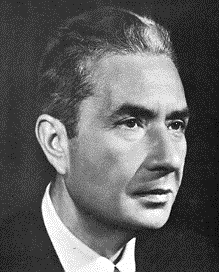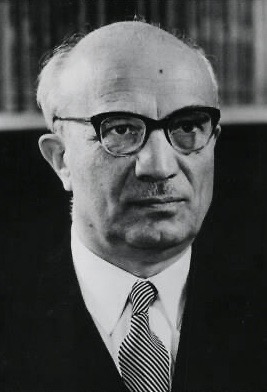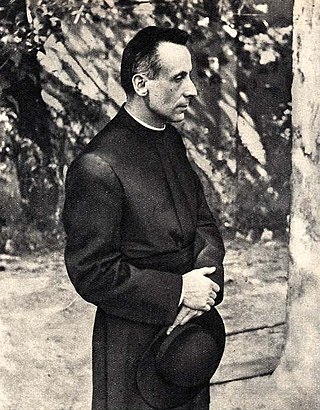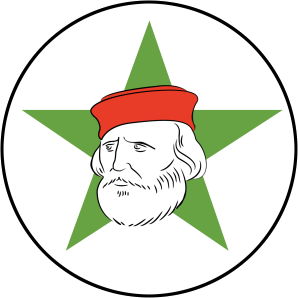Related Research Articles

Christian Democracy was a Christian democratic political party in Italy. The DC was founded on 15 December 1943 in the Italian Social Republic as the nominal successor of the Italian People's Party, which had the same symbol, a crusader shield. As a Catholic-inspired, centrist, catch-all party comprising both centre-right and centre-left political factions, the DC played a dominant role in the politics of Italy for fifty years, and had been part of the government from soon after its inception until its final demise on 16 January 1994 amid the Tangentopoli scandals. Christian Democrats led the Italian government continuously from 1946 until 1981. The party was nicknamed the "White Whale" due to its huge organisation and official colour. During its time in government, the Italian Communist Party was the largest opposition party.

Aldo Moro was an Italian statesman and prominent member of Christian Democracy (DC) and its centre-left wing. He served as prime minister of Italy in five terms from December 1963 to June 1968 and from November 1974 to July 1976.

Forza Italia was a centre-right liberal-conservative political party in Italy, with Christian democratic, liberal, social democratic and populist tendencies. It was founded by Silvio Berlusconi, who served as Prime Minister of Italy four times.

Mariano Rumor was an Italian politician and statesman. A member of the Christian Democracy (DC), he served as the 39th prime minister of Italy from December 1968 to August 1970 and again from July 1973 to November 1974. As prime minister, he led five different governments, supported by various coalitions.

Alcide Amedeo Francesco De Gasperi was an Italian politician and statesman who founded the Christian Democracy party and served as prime minister of Italy in eight successive coalition governments from 1945 to 1953.

Amintore Fanfani was an Italian politician and statesman, who served as 32nd prime minister of Italy for five separate terms. He was one of the best-known Italian politicians after the Second World War and a historical figure of the left-wing faction of Christian Democracy. He is also considered one of the founders of the modern Italian centre-left.

Giulio Andreotti was an Italian politician and statesman who served as the 41st prime minister of Italy in seven governments, and was leader of the Christian Democracy party and its right-wing; he was the sixth-longest-serving prime minister since the Italian unification and the second-longest-serving post-war prime minister. Andreotti is widely considered the most powerful and prominent politician of the First Republic.

Giuseppe Pella was an Italian Christian Democratic politician and statesman who served as the 31st prime minister of Italy from 1953 to 1954. He was also Minister of Treasury, Budget and of Foreign Affairs during the 1950s and early 1960s. Pella served as President of the European Parliament from 1954 to 1956 after the death of Alcide De Gasperi.

The Catholic Church and politics concerns the interplay of Catholicism with religious, and later secular, politics. The Catholic Church's views and teachings have evolved over its history and have at times been significant political influences within nations.

The Italian Socialist Party was a social democratic and democratic socialist political party in Italy, whose history stretched for longer than a century, making it one of the longest-living parties of the country. Founded in Genoa in 1892, the PSI was from the beginning a big tent of Italy's political left and socialism, ranging from the revolutionary socialism of Andrea Costa to the Marxist-inspired reformist socialism of Filippo Turati and the anarchism of Anna Kuliscioff. Under Turati's leadership, the party was a frequent ally of the Italian Republican Party and the Italian Radical Party at the parliamentary level, while lately entering in dialogue with the remnants of the Historical Left and the Liberal Union during Giovanni Giolitti's governments to ensure representation for the labour movement and the working class. In the 1900s and 1910s, the PSI achieved significant electoral success, becoming Italy's first party in 1919 and during the country's Biennio Rosso in 1921, when it was victim of violent paramilitary activities from the far right, and was not able to move the country in the revolutionary direction it wanted.

Giuseppe Dossetti was an Italian jurist, a politician, and also a Catholic priest from 1958 onward.

Giovanni Gronchi, was an Italian politician from Christian Democracy who served as the president of Italy from 1955 to 1962 and was marked by a controversial and failed attempt to bring about an "opening to the left" in Italian politics. He was reputed the real holder of the executive power in Italy from 1955 to 1962, behind the various Prime Ministers of this time.

The Italian Liberal Party was a liberal political party in Italy.

The Italian Socialist Party of Proletarian Unity was a political party in Italy, active from 1964 to 1972.

Paolo Emilio Taviani was an Italian political leader, economist, and historian of the career of Christopher Columbus. He was a partisan leader in Liguria, a Gold Medal of the Italian resistance movement, then a member of the Consulta and the Constituent Council, later of the Italian Parliament from 1948 until his death. Several times minister in the Republic’s governments. He was author of studies on economics and important works on Christopher Columbus, University professor and journalist.

Leopoldo Elia was an Italian politician.

The Italian People's Party was a Christian-democratic, centrist and Christian-leftist political party in Italy. The party was a member of the European People's Party (EPP).

The Popular Democratic Front, shortened name of the Popular Democratic Front for Freedom, Peace, Labour, was a left-wing political coalition in Italy. Formed in December 1947 by the Italian Socialist Party (PSI) and the Italian Communist Party (PCI), it contested the 1948 Italian general election.

Giuseppe Lazzati was an Italian Roman Catholic rector of the Sacred Heart college in Milan and a former parliamentarian. He was also the founder of the Secular Institute of Christ the King. Lazzati served as a professor and for a time served as a politician at the close of the Second World War despite initial hesitance in doing so. He later resigned to further dedicate himself to his lecturing while instituting the Secular Institute of Christ the King to bring together men who wished to consecrate themselves to God though not as religious. He was a collaborator of several well-known figures in Italian politics such as Giorgio La Pira and Aldo Moro while he maintained close relationships with Pope Paul VI and Pope John Paul II.

Luciano Dal Falco was an Italian politician.
References
- ↑ "Lazzati, Giuseppe". Dizionario di Storia (in Italian). 2010.
- 1 2 3 "L'attesa della povera gente". giorgiolapira.org (in Italian). 28 August 2020. Retrieved 1 July 2023.
- 1 2 Flavio Felice; Luca Sandonà (2019). "Luigi Sturzo's Socio-economic Development Theory and the Case of Italy: No Prophet in His Homeland". In Piotr Szwedo; Richard Peltz-Steele; Dai Tamada (eds.). Law and Development. Balancing Principles and Values. Singapore: Springer. p. 43. doi:10.1007/978-981-13-9423-2_3. ISBN 978-981-13-9423-2. S2CID 203478759.
- 1 2 "Cronache Sociali" (in Italian). University of Bologna Libraries. Retrieved 1 July 2023.
- 1 2 Renato Moro (2008). "The Catholic Church, Italian Catholics and Peace Movements: The Cold War Years, 1947–1962". Contemporary European History . 17 (3): 367–368. doi:10.1017/S0960777308004530. S2CID 162946837.
- ↑ "Archivio Leopoldo Elia (1921 - 2008)" (in Italian). Italian Parliament. Retrieved 1 July 2023.
- ↑ Elisa A. Carrillo (October 1991). "The Italian Catholic Church and Communism, 1943-1963". The Catholic Historical Review . 77 (4): 651. JSTOR 25023639.
- 1 2 Raphael Zariski (February 1965). "Intra-Party Conflict in a Dominant Party: The Experience of Italian Christian Democracy". The Journal of Politics . 27 (1): 8. doi:10.2307/2127999. JSTOR 2127999. S2CID 154071838.
- 1 2 3 Jan-Werner Müller (2013). "The Paradoxes of Post-War Italian Political Thought". History of European Ideas . 39 (1): 94. doi:10.1080/01916599.2012.664330. S2CID 144232970.